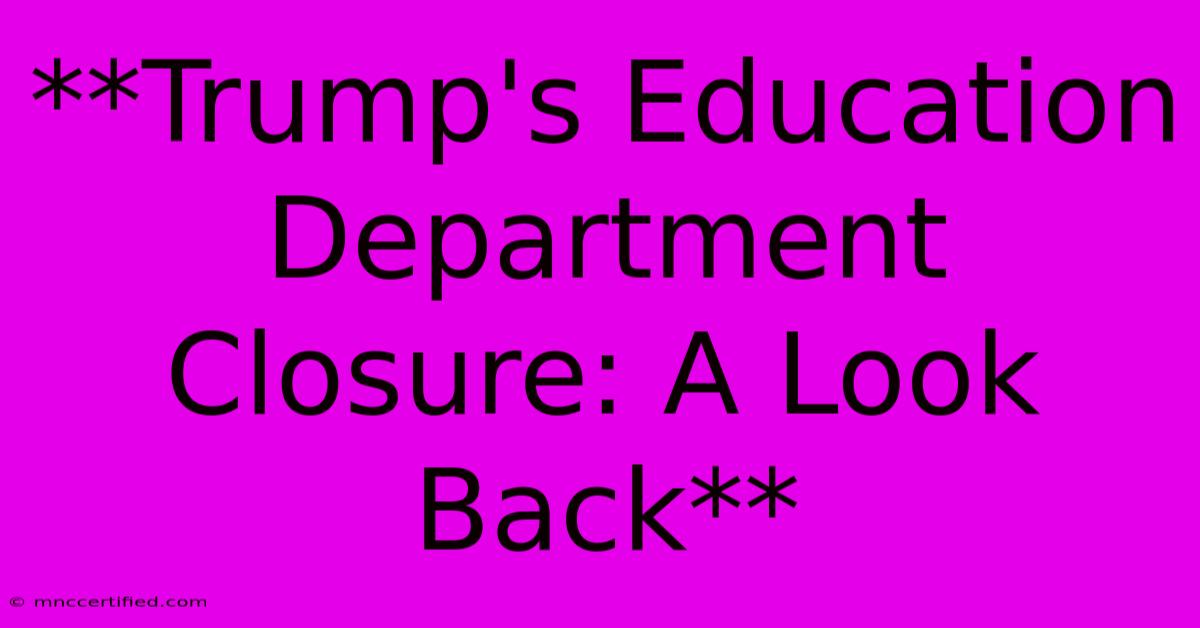**Trump's Education Department Closure: A Look Back**

Table of Contents
Trump's Education Department Closure: A Look Back
The idea of closing the U.S. Department of Education (ED) has been a recurring theme among conservatives for decades, advocating for a shift in control over education from the federal government to individual states and local communities. During his 2016 presidential campaign, Donald Trump made a vague promise to "look at" closing the ED, raising eyebrows and sparking debate. While he never actually attempted to dismantle the department, his administration's policies and actions significantly impacted the ED's role and focus.
This article will delve into Trump's education policies, analyzing their impact on the Department and examining the legacy he left behind.
The Promise of Decentralization
Trump's campaign rhetoric centered around a belief that education was best handled at the state and local level, advocating for "school choice" and empowering parents with greater control over their children's education. This ideology resonated with many Republicans, who believed that federal involvement in education was overly bureaucratic and stifled innovation.
While the idea of abolishing the ED was never seriously pursued, the Trump administration's actions spoke volumes. The budget for the ED was slashed, and many programs were either eliminated or significantly scaled back.
The Impact of Policy Changes
Some of the key policy changes enacted by the Trump administration included:
- School Choice Expansion: The administration supported initiatives like the "Education Freedom Scholarships" that allowed states to use federal funds for private school tuition, advocating for increased options for families.
- Teacher Accountability: The Trump administration focused on merit pay for teachers, aiming to reward high-performing educators and incentivize improved student outcomes.
- Regulation Rollbacks: Numerous regulations related to accountability and reporting were rolled back, empowering states to implement their own standards.
These changes significantly impacted the ED's role, shifting its focus from a national regulator to a facilitator of state and local initiatives.
The Legacy of Trump's Education Policies
The legacy of Trump's education policies remains a topic of debate. Proponents argue that his administration's focus on local control empowered states to tailor education to their unique needs, leading to increased innovation and student achievement.
Critics, however, highlight the potential negative consequences of decreased federal oversight, such as increased inequality, reduced support for disadvantaged students, and the erosion of national educational standards.
The Future of the Department of Education
The future of the ED remains uncertain. While the department continues to exist, its role and focus have evolved significantly under different administrations. The ongoing debate over federal involvement in education highlights the complex interplay between national, state, and local priorities.
Ultimately, the role and future of the Department of Education will depend on the political will of the elected officials who shape its policies. Whether the department remains a powerful national agency or transitions towards a more decentralized model will continue to be a central question in the American education landscape.

Thank you for visiting our website wich cover about **Trump's Education Department Closure: A Look Back** . We hope the information provided has been useful to you. Feel free to contact us if you have any questions or need further assistance. See you next time and dont miss to bookmark.
Featured Posts
-
Independent Insurance Agents Tucson
Nov 13, 2024
-
Huckabee Pro Settlement Named Israel Envoy
Nov 13, 2024
-
Explosion At Kentucky Factory Injuries Missing
Nov 13, 2024
-
Skai Jackson Pregnant Expecting First Baby
Nov 13, 2024
-
Skai Jackson Shares Pregnancy News Disney Stars Journey
Nov 13, 2024